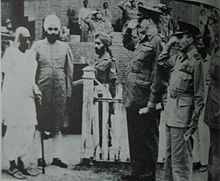Baldev Singh
Baldev Singh | |
|---|---|
Member of Parliament - Lok Sabha | |
| In office 1952–1959 | |
| Personal details | |
| Born | July 11, 1902 Akali Dal |
| Alma mater | Khalsa College |
Baldev Singh (
After independence, Baldev Singh was chosen to become the first
Early life and political career
Baldev Singh was born on 11 July 1902 in the village of Dumna in a
Baldev Singh won an election to the Punjab provincial assembly under the
Cripps Mission and World War II
When the Cripps Mission arrived in India in 1942 to offer Indians some form of self-government, Baldev Singh was chosen to represent the Sikh community in the talks, which also included the chief Indian political party, the Indian National Congress and Muslim League party. The Mission failed to make any progress.
While the Congress Party launched the
Cabinet Mission and government
Baldev Singh was chosen again to represent the Sikh viewpoint to the Cabinet Mission Plan that had arrived to discuss proposals for Indian political independence. Singh reiterated the Sikh view that India should remain a united country with special protections for the rights of religious minorities. Singh also insisted that should partition become inevitable, the division of the Punjab should happen in a way to offer territorial protection to the Sikhs from
Although Baldev Singh and other Sikhs initially opposed the implementation of the Mission's 16 May scheme, on the grounds that it did not offer any protection to the Sikh community, Baldev Singh joined the new Viceroy's Executive Council, to be headed by Congress leaders
Partition of India
Although Baldev Singh and other Sikhs initially opposed the implementation of the Mission's 16 May scheme, in the grounds that it did not offer any protection to the Sikh community, Baldev Singh joined the new Viceroy's Executive Council, to be headed by Congress leaders Jawaharlal Nehru and Vallabhbhai Patel as the Sikh member. Singh became the Defence minister.
As defence minister

On 15 August 1947, India became an independent nation and Baldev Singh became India's first
Along with
The Army was caught unprepared, and itself was torn apart by the conflict. Thousands of Muslim officers were leaving for Pakistan. Riots had broken out in
Defence Minister Singh also led the preparations and planning
In September 1948, Baldev Singh and his commanders prepared plans for
After the 1952 elections of India, Singh was succeeded by N. Gopalaswami Ayyangar as defence minister.[4]
Later life
In 1952, Baldev Singh was elected to the
Singh died in Delhi after a prolonged illness in 1961. He was survived by his two sons, Sarjit Singh (1927–1993 AD) and Gurdip Singh. Sarjit Singh was the Co-operatives minister in the government of Parkash Singh Badal. He was married to Raj Mohinder Kaur and is survived by his son TejBal Singh and his daughter Jaspreet Kaur. Gurdip Singh was married to Baljit Kaur and had 4 children. Baldev Singh had 7 great grandchildren. His nephew Ravi Inder Singh was the Speaker of the Punjab Vidhan Sabha.
See also
- History of the Punjab
- Indian independence movement
- Partition of India
- Shiromani Akali Dal
- Tara Singh Malhotra
References
- ^ "Sardar Baldev Singh, 58, Dies; First Defense Minister of India". The New York Times. 30 June 1961.
- ^ "Kashmir letters cast doubt on claims Nehru blundered by agreeing ceasefire". The Guardian. 8 March 2023. Retrieved 10 March 2023.
- ^ Paul, Bikash C. (14 December 2019). "Cobrapost Exclusive: Nehru wanted to attack Pakistan in 1947 after it invaded Kashmir". Cobrapost.
- ISBN 978-0-520-37041-8.
External links
 Media related to Baldev Singh at Wikimedia Commons
Media related to Baldev Singh at Wikimedia Commons- https://web.archive.org/web/20051102003148/http://www.sikh-history.com/sikhhist/personalities/sewadars/baldev.html
